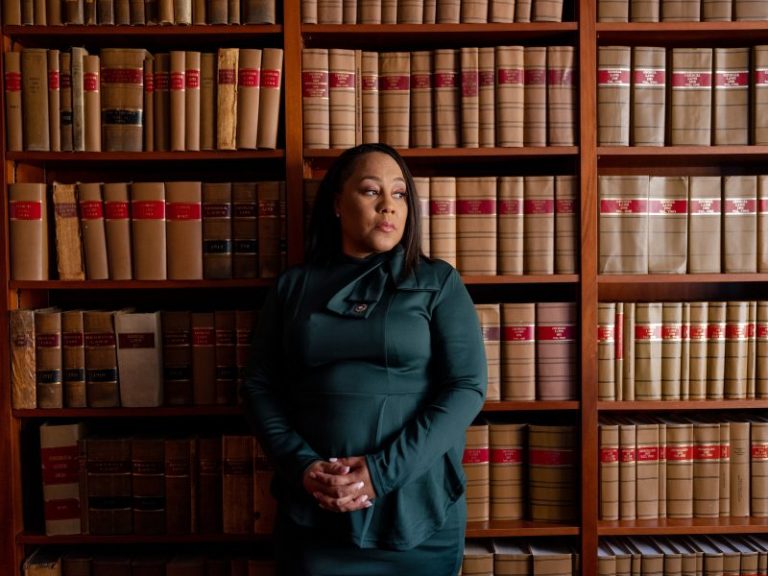Former president Donald Trump and his allies could soon be facing allegations in Georgia of a serious crime — racketeering — in connection with their efforts to overturn that state’s election results in 2020.
Here’s what that means and how such a law might be used:
You’ll see it referred to as RICO. It allows prosecutors to weave together several alleged crimes into one racketeering charge that calls for up to 20 years in prison.
Trump Georgia election case
End of carousel
“It allows a lot of different things to be pulled together into a single very serious criminal charge,” said Clark Cunningham, a law professor at Georgia State University.
Fani Willis is the top prosecutor for Georgia’s Fulton County, which is home to Atlanta. She’s a Democrat elected to the job in 2020, and soon after she took office she launched an investigation of Trump’s attempts to overturn the election results in her state.
Two and a half years into her investigation, Willis has strongly signaled she will use the law to seek charges against Trump and several of his associates or supporters. Willis said she likes applying the RICO statute because it “allows you to tell jurors the full story,” she said in an interview with The Washington Post last year “I have right now more RICO indictments in the last 18 months, 20 months, than were probably done in the last 10 years out of this office,” Willis said.
Or gang leaders or human traffickers — the law is designed to prosecute a criminal enterprise.
When people “hear the word ‘racketeering,’ they think of ‘The Godfather,’” Willis told the New York Times. But the concept of racketeering “has been extended to include any kind of organization that engages in a pattern of prohibited criminal activity to accomplish its goals,” Cunningham said. So this could be applied, legal experts theorize, to the collection of lawyers, political operatives and Republican legislators who tried to overturn the results in Georgia, allegedly at Trump’s behest.
The federal version of RICO was used in the 1980s to prosecute mob bosses who weren’t the ones directly committing the crimes but rather the orchestrators of a broader scheme. For example, Nick Akerman, a lawyer and former prosecutor, wrote in the Atlanta Journal-Constitution that he was able to tie a murder plot in California and an extortion plot in Brooklyn to bankruptcy fraud in New York to take down a mob boss. Akerman wrote that Trump and his allies’ alleged attempt to undermine the peaceful transfer of power “fits neatly” under Georgia’s RICO law.
It allows prosecutors to weave together a wide variety of alleged crimes, including violations of state and federal laws — and even activities in other states. To make a racketeering case, prosecutors need at least two underlying potential crimes in the furtherance of an enterprise. The law does not require a defendant to set foot in Georgia to be charged.
Willis has practice using RICO in creative ways. A decade ago, she was part of a team that prosecuted schoolteachers in a standardized-test cheating scandal. Right now, her office is prosecuting rapper Young Thug on racketeering charges related to alleged gang activity.
In many ways, Georgia was the center of the Trump campaign’s attempt to keep him in power after he lost the 2020 presidential election.
Trump unleashed his allies to try to find fraud in the state. In the weeks after the election, Georgia’s governor, its secretary of state and top aides — all of them Republican — publicly talked about the intimidation they received from Trump supporters after they resisted efforts to change the election results. “Stop inspiring people to commit potential acts of violence,” Gabriel Sterling, a top Georgia election official (and a Republican) publicly pleaded to Trump. “Mr. President,” he said, “you have not condemned these actions or this language.”
Trump called top officials himself. After Joe Biden’s win in Georgia was certified, Trump called the secretary of state, Republican Brad Raffensperger, and asked him to find enough examples of fraudulent votes to overcome his margin of loss.
Legal experts say it’s possible Trump will be wrapped up in these charges. “It would be enormously anticlimactic if it didn’t include him,” said Caren Morrison, a former federal prosecutor now at Georgia State University. The racketeering law in Georgia requires all these actions to be taken in furtherance of a scheme. His objective was “clear,” Morrison said of Trump. “Maintain the presidency by any objective possible.”
Ongoing investigations involving Donald Trump
1/6
End of carousel
The earliest version of the Georgia law was enacted in the 1980s by a largely Democratic legislature, not long after the federal law came into being. Legislators at the time cited “the increasing sophistication of various criminal elements” for the need to have such a serious crime on the books. It has been expanded over the years to include potential digital criminal activity.
Some of the first prosecutions in the state were against politicians: Georgia’s labor commissioner was convicted of racketeering for efforts to stay in office after he lost the election. So was a county commissioner who tried to have his successor killed after losing the vote.

